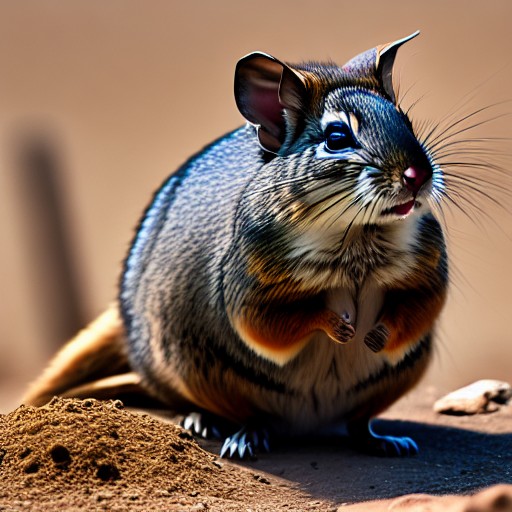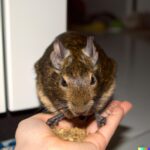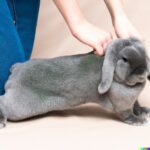If you’re considering getting a pet degu, you may be wondering how big these adorable rodents can get. Degus are social and intelligent animals that make great pets for those who are willing to provide them with the necessary care and attention. In this article, we’ll take a closer look at the size of degus, including their weight, length, and other physical characteristics.
Degus are small, furry rodents that are native to Chile. They are known for their social behavior, intelligence, and playful nature, making them a popular choice for those who are looking for a unique and interesting pet. However, before bringing a degu home, it’s important to understand their size and other physical characteristics to ensure that you can provide them with the care they need.
How Big Can A Degus Get?
Degus 101: Basic Facts About These Rodents
Before diving into the topic of degu size, let’s go over some basic facts about these adorable rodents. Degus are diurnal animals, which means they are most active during the day. They are social creatures and should be kept in pairs or groups to prevent loneliness and promote their well-being. In the wild, degus are herbivores and primarily eat grass, seeds, and other plant matter.
How Big Can Degus Get? Understanding Their Size and Weight
On average, adult degus weigh between 200 and 300 grams, or about 7 to 10 ounces. They typically measure between 25 and 30 centimeters (10 to 12 inches) in length, including their tails. However, the size of degus can vary depending on a number of factors.
Factors That Affect Degu Size
Several factors can affect the size of a degu. Genetics play a role in determining their size, so if you’re getting a degu from a breeder, you may want to ask about the size of the parents. Diet and exercise can also impact the size of a degu. Providing your pet with a healthy and balanced diet, as well as plenty of opportunities to exercise and play, can help ensure that they reach their full potential in terms of size.
How to Care for Your Degu: Tips for Keeping Them Healthy and Happy
To keep your degu healthy and happy, it’s important to provide them with the right care. This includes giving them a spacious cage with plenty of toys and opportunities for exercise, as well as a healthy and balanced diet that meets their nutritional needs. You should also provide them with plenty of socialization and interaction, as degus are highly social animals that thrive on companionship.
Common Health Problems in Degus: What to Watch Out For.
Like all animals, degus can experience health problems. Some common health issues in degus include dental problems, skin conditions, and respiratory infections. It’s important to monitor your pet’s health and behavior closely and seek veterinary care if you notice any signs of illness or discomfort.
8. Conclusion
In conclusion, the size of degus can vary depending on a number of factors, including genetics, diet, and exercise. To keep your degu healthy and happy, it’s important to provide them with the right care, including a healthy diet, plenty of exercise, and socialization. By understanding their size and other physical characteristics, you can ensure that you are able to provide your pet with the care and attention they need to thrive.
Frequently Asked Questions About Degus
- Can degus be litter-trained? Yes, degus can be litter-trained with patience and consistency. It’s important to provide them with a designated area for elimination and to reward them for using it.
- How often should I clean my degu’s cage? Degus should have their cages cleaned at least once a week, although more frequent cleaning may be necessary if they are particularly messy or if the cage is small.
- Are degus good pets for children? Degus can make great pets for responsible children who are able to provide them with the necessary care and attention. However, they may not be the best choice for very young children, as they require some specialized care.
- Do degus need to see a veterinarian? Yes, degus should see a veterinarian regularly for check-ups and to address any health concerns. It’s important to find a veterinarian who has experience working with small animals.
- What kind of toys do degus like? Degus enjoy toys that allow them to climb, dig, and chew. Some good options include wooden blocks, cardboard tubes, and exercise wheels. It’s important to provide them with a variety of toys to prevent boredom and promote their well-being.
- Can degus be kept alone? No, degus are social animals that require companionship. They should be kept in pairs or groups to prevent loneliness and promote their well-being.
- How long do degus typically live? Degus typically live between 5 and 8 years, although some may live longer with proper care.
- What should I feed my degu? Degus should be fed a diet that is high in fiber and low in fat and sugar. This can include hay, fresh vegetables, and a small amount of pellets or commercial degu food.
- Are degus difficult to care for? Degus require some specialized care, including a spacious cage, regular exercise, and socialization. However, with the right knowledge and commitment, they can make wonderful and rewarding pets.










